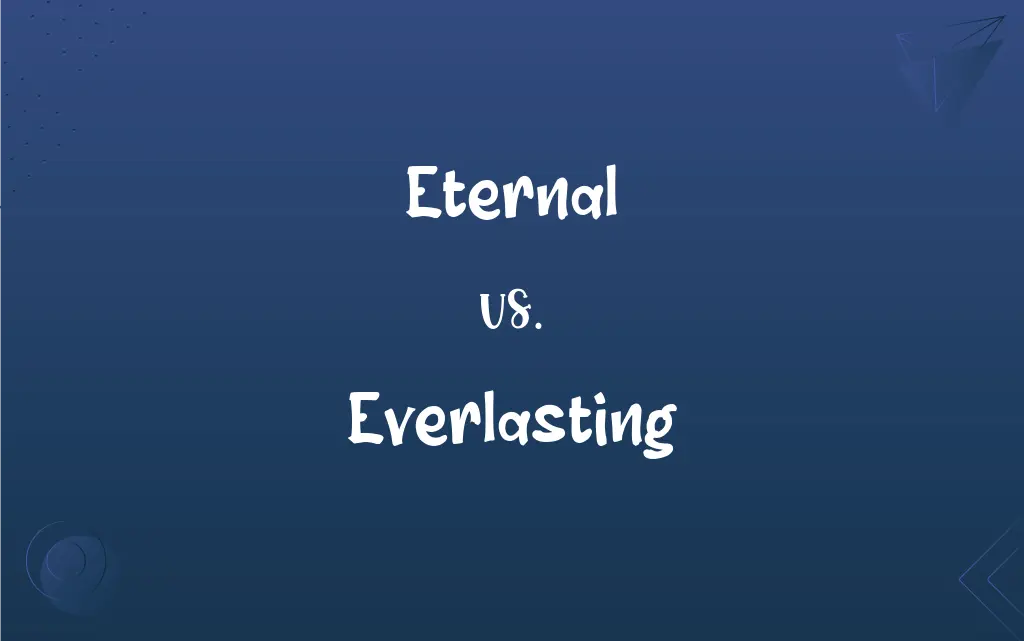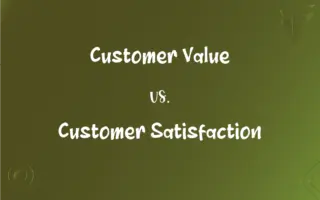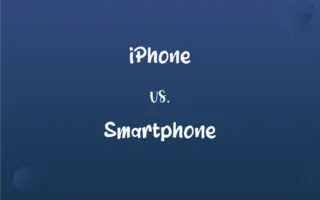Eternal vs. Everlasting: What's the Difference?
Edited by Aimie Carlson || By Harlon Moss || Published on February 18, 2024
Eternal refers to timelessness, existing outside of time, while everlasting means lasting forever within the concept of time, but having a beginning.

Key Differences
Eternal implies an existence that transcends time, lacking both a beginning and an end, often associated with spiritual or philosophical concepts. Everlasting, however, denotes something that lasts indefinitely but within the confines of time, having started at some point.
In religious or metaphysical contexts, eternal is used to describe entities or concepts that are inherently timeless, like the nature of the universe or divinity. Everlasting, on the other hand, is more commonly used for things within the temporal world that will not cease, like a legacy or a memory.
Eternal can convey a sense of transcendence, often beyond human comprehension, suggesting an existence beyond the physical realm. Everlasting tends to be more grounded within the human experience, emphasizing continuity and unending duration rather than timelessness.
In literature and poetry, eternal often symbolizes an idea or emotion that is unchanging and constant, beyond the limits of temporal existence. Everlasting is frequently used to describe enduring love, loyalty, or memory, acknowledging their commencement but asserting their unending nature.
Eternal can denote a state of being that is perpetual and infinite, not confined by temporal boundaries. Everlasting, while implying an endless duration, acknowledges the flow of time and the commencement of the state or entity it describes.
ADVERTISEMENT
Comparison Chart
Time Relation
Exists outside of time
Lasts forever within time
Beginning and End
Neither beginning nor end
Has a beginning, no end
Common Usage
Spiritual, metaphysical concepts
Temporal world entities
Human Experience
Transcends human comprehension
Grounded in continuity
Literary Symbolism
Timeless ideas or emotions
Enduring qualities or emotions
ADVERTISEMENT
Eternal and Everlasting Definitions
Eternal
In philosophy, eternal denotes something that is not subject to time.
The eternal truths of the universe remain undiscovered.
Everlasting
Everlasting refers to something that will not cease.
The legend of the hero became an everlasting tale.
Eternal
Eternal means existing outside of time, without beginning or end.
The concept of the soul is often considered eternal.
Everlasting
In a temporal context, everlasting denotes enduring existence.
The everlasting light of the lighthouse guided sailors home.
Eternal
Eternal is often used in a spiritual context to describe divinity.
Many religions speak of an eternal deity.
Everlasting
Everlasting means lasting indefinitely, but within the concept of time.
Their friendship was an everlasting bond.
Eternal
Eternal can symbolize unchanging permanence.
The stars in the sky appeared eternal to the ancient observers.
Everlasting
Everlasting is used to describe continuous, unending duration.
Her everlasting passion for art inspired many.
Eternal
Eternal can refer to an infinite or timeless state.
Their love was described as eternal.
Everlasting
Everlasting implies continuity without end, acknowledging a start.
The memory of that day was everlasting in his mind.
Eternal
Being without beginning or end
Belief in an eternal creator.
Everlasting
Lasting forever; eternal.
Eternal
Continuing without interruption; perpetual
Earned my eternal gratitude.
Everlasting
Continuing indefinitely or for a long period of time.
FAQs
Can something be both eternal and everlasting?
Conceptually, they differ; something eternal is inherently not everlasting and vice versa.
How do philosophers view the concept of eternal?
As something that transcends time and existence.
Is eternal used more in religious contexts?
Yes, it's often used to describe concepts like God or the soul.
Does everlasting have a beginning?
Yes, it starts at a point but continues indefinitely.
Can human life be termed eternal?
Not typically, as it has both a beginning and an end.
Is the universe considered eternal or everlasting?
Opinions vary; some view it as eternal, others as everlasting.
Do memories fall under eternal or everlasting?
They are often considered everlasting, enduring in time.
Can love be described as eternal?
Yes, when symbolizing a timeless, unchanging emotion.
Is eternal the same as everlasting?
No, eternal is timeless, while everlasting has a duration but no end.
How do religions interpret everlasting life?
As a continuation of existence beyond physical life.
Is nature considered everlasting?
Yes, often seen as enduring through time.
Does everlasting imply immortality?
It implies unending existence, not necessarily immortality.
Can a moment be eternal?
In a figurative sense, to represent a significant, timeless memory.
How are eternal and everlasting used in poetry?
To evoke feelings of timelessness or unending existence.
How is eternal used in literature?
To symbolize concepts that are unchanging and constant.
Can art be eternal?
It can be, in the sense of enduring cultural significance.
Is an everlasting flame physically possible?
In a metaphorical sense, yes; physically, it's improbable.
Are eternal truths absolute?
They are often considered absolute and unchanging.
Is the concept of eternity abstract?
Yes, it's a complex, often philosophical or spiritual concept.
Do eternal and everlasting have synonyms?
Yes, but each word's synonyms align with its specific meaning.
About Author
Written by
Harlon MossHarlon is a seasoned quality moderator and accomplished content writer for Difference Wiki. An alumnus of the prestigious University of California, he earned his degree in Computer Science. Leveraging his academic background, Harlon brings a meticulous and informed perspective to his work, ensuring content accuracy and excellence.
Edited by
Aimie CarlsonAimie Carlson, holding a master's degree in English literature, is a fervent English language enthusiast. She lends her writing talents to Difference Wiki, a prominent website that specializes in comparisons, offering readers insightful analyses that both captivate and inform.































































